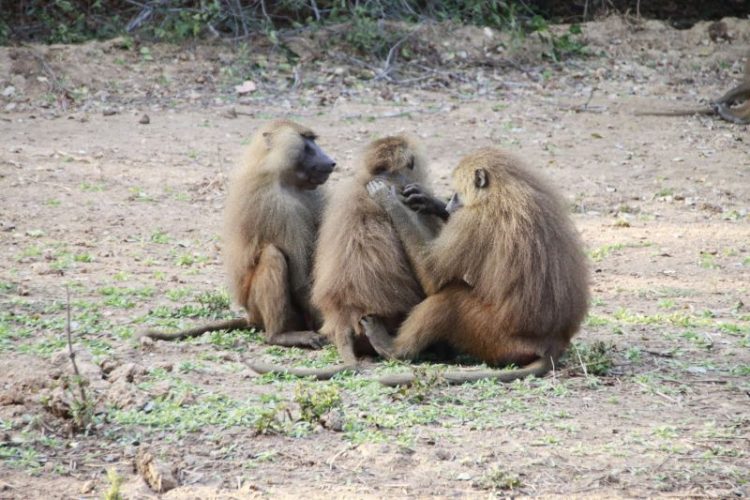Male–male bonds as a key to the evolution of complex social systems

Male Guinea baboons (Papio papio) are grooming each other. Photo: Julia Fischer
Contests, threats, at best ignore one another: The relationships between male mammals are usually described in this or a similar way. The situation is quite different in humans where strong partnerships and close ties between unrelated men are widespread.
Ranging from the joint construction of a hut up to the decisions of Executive Board members, there are countless examples that friendships among men bring decisive advantages and are a core ingredient of the complexity of human societies.
In their recently published study, Julia Fischer and her colleagues from the German Primate Center (DPZ) in Göttingen found that male Guinea baboons are tolerant and cooperative towards their same-sex conspecifics, even if they are not related. In this way, males actively contribute to the cohesion of their multilevel Baboon society. Guinea baboons are therefore a valuable model to understand the social evolution of humans (Patzelt et al., 2014, PNAS).
Within a long-term field study conducted at the DPZ Research Station Simenti in Senegal, a population of Guinea baboons was observed over a period of two years. The scientists found that the social organization of the Guinea baboon has three tiers.
The smallest and central units of the society are so-called parties comprising of three to four males with their associated females and their infants. Close social bonds between males are formed within the parties. The next higher level is the gang that consists of two or three parties. Also within the gang, some friendly social interactions between males could be observed. The third level includes all animals that share a home range and is referred to as a community.
“The degree of kinship did not affect the social interaction. The males form close cooperative connections with both related and unrelated conspecifics”, says Julia Fischer, head of the Cognitive Ethology Laboratory at the German Primate Center. Furthermore, the male Guinea baboons showed far less rivalry as well as less aggression towards females than for example the chacma baboons. Interestingly, traits associated with intersexual competition such as the size of their canine teeth or testicles were also smaller in Guinea baboons than in other species.
“Our results show that a complex social organization builds on the emergence and maintenance of cooperation regardless of the genetic relationships”, says Julia Fischer. Humans live in a multilevel social system too, where the smallest unit is the family. Within traditional societies, male individuals enter strong cooperative relationships with each other regardless of the degree of kinship. The occurrence of these bonds is associated with the evolutionary development of multilevel societies. „In order to understand our social evolution non-human primates who live in complex communities are important models”, says Julia Fischer.
In future studies, the researchers want to investigate the role of females in the male friendships. Perhaps they prefer males with an established network and can thereby contribute to a more intensive friendship between males.
Original publication
Patzelt A et al. (2014): Male tolerance and male-male bonds in a multilevel primate society. PNAS, doi:10.1073/pnas.1405811111
Contact
Prof. Dr. Julia Fischer
Tel: +49 551 3851-375
E-mail: jfischer@dpz.eu
Dr. Susanne Diederich (Communication)
Tel: +49 551 3851-359
E-mail: sdiederich@dpz.eu
Printable pictures are available in our Mediathek. We kindly request a specimen copy in case of publication.
The German Primate Center (DPZ) – Leibniz Institute for Primate Research conducts biological and biomedical research with primates in infection research, neuroscience and primate biology. The DPZ maintains three field stations in the tropics and is the reference and service center for all aspects of primate research. The DPZ is one of 89 research and infrastructure facilities of the Leibniz Association.
http://medien.dpz.eu/webgate/keyword.html?currentContainerId=2321 – Printable images
http://www.pnas.org/content/early/2014/09/04/1405811111.full.pdf+html – Original publication
http://www.dpz.eu/en/home/single-view/news/maennerfreundschaften-als-schluessel-… – DPZ Webpage
Media Contact
All latest news from the category: Studies and Analyses
innovations-report maintains a wealth of in-depth studies and analyses from a variety of subject areas including business and finance, medicine and pharmacology, ecology and the environment, energy, communications and media, transportation, work, family and leisure.
Newest articles

First-of-its-kind study uses remote sensing to monitor plastic debris in rivers and lakes
Remote sensing creates a cost-effective solution to monitoring plastic pollution. A first-of-its-kind study from researchers at the University of Minnesota Twin Cities shows how remote sensing can help monitor and…

Laser-based artificial neuron mimics nerve cell functions at lightning speed
With a processing speed a billion times faster than nature, chip-based laser neuron could help advance AI tasks such as pattern recognition and sequence prediction. Researchers have developed a laser-based…

Optimising the processing of plastic waste
Just one look in the yellow bin reveals a colourful jumble of different types of plastic. However, the purer and more uniform plastic waste is, the easier it is to…



